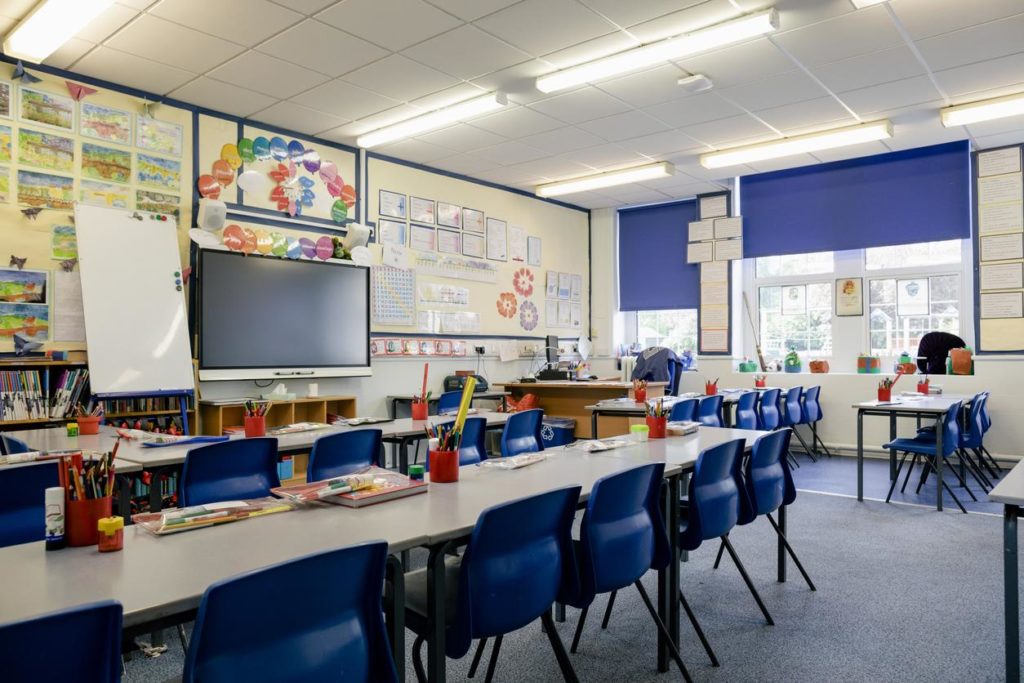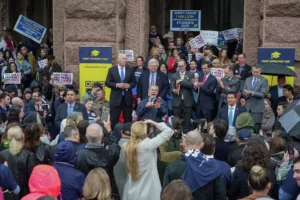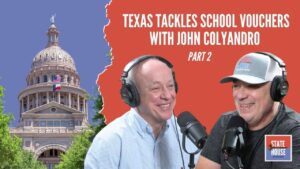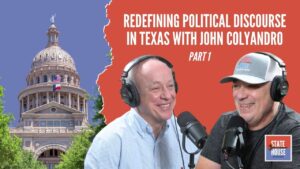“If Abbott-backed challengers prevail in five or six races, that will be a show of force powerful enough to flip the political dynamics in the House”, said John Colyandro, a former senior advisor and policy director for Abbott’s campaign and office.
But no matter Tuesday’s results, he said, Abbott’s work on education issues will be “a cornerstone of this governor’s legacy.”
For the last two months, Gov. Greg Abbott has embarked on a statewide revenge tour, stopping at barbecue restaurants, breweries, country clubs, churches, car dealerships and museums.
Through stump speeches, online attacks and millions in spending this year, the Republican governor has targeted about a dozen GOP state lawmakers who scuttled his plan last fall to provide families with taxpayer dollars for private education.
VOTER GUIDE: The local and national races that your vote will decide in the March 5 primaries
If he can oust enough of them, Abbott will all but ensure that private school vouchers pass the Legislature next year, breaking a blockade that has lasted decades and changing the face of public education in the state.
The political stakes are high for the third-term governor, and March 5 could bring the greatest political triumph of his career — or the biggest disappointment.
“If the governor wants the party to be modeled in his image, he’s got to get some signature wins,” said Brandon Rottinghaus, a political science professor at the University of Houston. “If he can’t deliver these votes it’ll split the party, it’ll make him look weak and it’ll hurt his credibility going into the next session.”
A hard-fought policy win on school vouchers would give Abbott’s resume a one-up on past Govs. Rick Perry and George Bush, and it would match that of other Republican governors across the country who have recently expanded voucher programs in their states.
It would also come at a time when polls show Abbott is surging in popularity and as his national profile is on the rise because of his divisive border crackdown and busing of migrants to Democratic-led cities.
Abbott is targeting at least 14 key GOP primaries that feature either an anti-voucher lawmaker or an open contest, spending more than $5 million this year to support those candidates, plus an additional $1.3 million to support existing voucher allies. His campaign declined to make him available for an interview.
Many of the incumbents are from rural areas, where there are few private schools and the public school districts are major economic engines, factors they say make vouchers a tough sell to their voters.
On the trail, Abbott hammers a message that polls show vouchers are actually very popular, even in rural areas, and that families should be able to pick their school no matter the cost.
“Every parent is given the power by God to make the ultimate decisions for the children, and that includes decisions about their education,” Abbott said at a recent campaign stop in San Antonio, where he hopes to unseat Republican state Rep. Steve Allison.
If Abbott-backed challengers prevail in five or six races, that will be a show of force powerful enough to flip the political dynamics in the House, said John Colyandro, a former senior advisor and policy director for Abbott’s campaign and office.
But no matter Tuesday’s results, he said, Abbott’s work on education issues will be “a cornerstone of this governor’s legacy.”
‘Meeting a moment’
The public turning point for Abbott on vouchers was a May 2022 campaign rally at PicaPica Plaza in South San Antonio.
Although the governor has long supported “school choice,” for much of his political career, it was not a top issue like it was for prominent Texas Republicans U.S. Sen. Ted Cruz or Lt. Gov. Dan Patrick.
But on that day in San Antonio, before a crowd of about 150 people waving red-and-green “Parents Matter” signs, Abbott promised to fight in the next legislative session for a voucher program open to all Texas students.
The push for such a program marked an escalation of the “Parental Bill of Rights” Abbott had been promoting as Republicans in other states showed how education could be a winning issue for conservatives.
“Nothing is more critical to the development and success of our children than parents,” the governor told the crowd, saying he wanted to “empower parents” by giving them funds to send their kids to any school, whether it was public or private.
Soon after, the governor erected “Parents Matter” ads on highway billboards across Texas. Local and national groups that back vouchers began ramping up their operations in the state, and Abbott launched a tour to promote the policy at Christian private schools around the state.
Abbott has long supported vouchers, Colyandro said, but he decided to make a stronger push after many parents were dissatisfied with their child’s schooling following the COVID-19 pandemic.
“I think it was his policy principles meeting a moment where he is determined this is going to get done, and he’s using all the tools that he has available to make sure this gets done,” said Colyandro, now a lobbyist and consultant who advocates for vouchers, among other issues. “He could have, as many elected officials could do, is say, ‘I’m for school choice,’ and it ends there. He’s made the determination to make it a priority.”
In response to the 2022 speech, teachers unions, school district groups and other public school supporters geared up for their stiffest fight in decades.
While the Texas Senate led by Patrick easily passed its own voucher program, public schools found allies in about two dozen GOP House members, who worried vouchers would drain critical dollars from public school districts and send them to private schools with little public accountability. Texas already spends about $4,000 less per student each school year than the national average, while teacher salaries lag by about $7,000.
As the end of the Legislative session loomed, a deal looked close between the Senate, House and Abbott that would allow for a narrow voucher program in exchange for extra school funds.
But Abbott ultimately declared it didn’t go far enough.
He insisted on a universal voucher plan and said he would not sign other school funding or teacher pay raise bills without it. He called lawmakers back to Austin a series of special sessions, threatening GOP holdouts with political consequences.
In November, opponents won out when a group of 21 Republicans voted to untether Abbott’s voucher plan from billions in proposed extra school dollars and teacher pay raises. Afterward, the bill’s author, who had worked closely with Abbott to draft the legislation, pulled the bill from consideration.
Now, across those 21 districts, Abbott has endorsed just over a dozen candidates, both challengers to incumbents as well as those running in seats left open by retirement — Abbott’s most widespread attempt to cull dissenting voices within his party.
He’s also campaigning for other Republican incumbents around the state, but only those who supported his voucher plan. Aiding his effort are big-dollar donors, including Jeff Yass, a Pennsylvania billionaire and voucher proponent who cut Abbott a record-breaking $6 million check.
Abbott’s campaign did not respond to questions about why he isn’t targeting all 21 seats.
Many of those Abbott hopes to oust are aligned with him on nearly all his other priorities. Just last year, they voted to send billions of new dollars to Abbott’s border operation, to rid school libraries of LGBTQ material and bar transgender youth from accessing transition care.
Rep. Ernest Bailes, a Shepherd Republican whom Abbott endorsed in 2019 and now opposes, said the governor has prioritized politics over the well-being of Texas children.
“The only reason we’re doing this is so that one person has a political victory,” Bailes told Hearst Newspapers last fall. “There’s not a single individual who could tell me that vouchers in the state of Texas, is what will be absolutely best for the kids in the state of Texas.”
Two years ago, Bailes easily defeated his opponent, Janis Holt, who ran a mostly self-financed campaign against him. This time, Abbott’s campaign has donated more than $700,000 to Holt, a voucher supporter and Abbott appointee to the State Commission on Judicial Conduct. He has twice visited the East Texas district to host rallies for her.
In several other key races, Abbott’s campaign sent cease-and-desist letters to incumbent Republicans he had previously endorsed, demanding that they scrub their campaign websites of any references to his past support.
“It is unfortunate that you would misrepresent Governor Abbott’s position, which serves only to confuse voters about who is the actual conservative candidate in the race,” the governor wrote in one letter.
Members complain that Abbott is now opposing them based solely on vouchers, saying it shows he doesn’t respect their need to represent their particular districts.
“I’ve been with the governor on every single issue since I’ve been in the House – every single one except school vouchers,” said Allison, a San Antonio Republican in a tight re-election bid with Abbott-backed challenger Marc LaHood. “I just can’t get there on private school vouchers.”
‘Get the woke out of the kids’ heads’
While Abbott hammers on vouchers, most Texas primary voters name other issues as their top priority, raising questions about whether the governor’s push will resonate with enough of the state’s GOP electorate.
On the campaign trail, Abbott often cites a 2022 survey that found a vast majority of GOP primary voters agree students who attend private school should have access to the dollars that support them in public school. Republicans who oppose vouchers are ignoring the wishes of their own voters, he warns.
However, during Abbott’s own speeches, he gets the most applause on border or culture war issues, which he often uses to pivot to vouchers.
“We will use education and your tax dollars to educate our kids, not to indoctrinate our kids,” Abbott said at one recent campaign stop in San Antonio, echoing a line he has used many times over the last two years.
Earlier this month, Abbott visited the panhandle to stump for one of his chosen candidates, Caroline Fairly, who is running to replace anti-voucher Rep. Four Price after his retirement. Fairly has said she’ll support Abbott’s voucher plan.
The large crowd packed into Tyler’s Barbeque in Amarillo, growing restless as the governor ran several minutes late.
Near the back stood Lane and Bob Mende, who described themselves as strong supporters of school vouchers.
“The biggest thing I like about school choice is to get the woke out of the kids’ heads,” Bob said, saying he feels public schools are “teaching kids that whites are the problem and Blacks can’t get nowhere and the whites are holding them down.”
It’s not a new issue, they said. They raised their son with conservative values, but after a high school social studies teacher encouraged him to think more critically about Texas history, he began challenging them on their political beliefs. Now he identifies as an independent.
Vouchers would make it easier for parents to send their children to Catholic schools, Bob said.
“I think it should be allowed and free just like public schools are,” Lane said. “It might harm public schools, but also it might encourage them to improve.”
But when asked whether vouchers were an important subject to deciding their votes, the answer was emphatic.
“No, not at all,” Lane said. The border is such an all-encompassing crisis that schools pale in comparison, he said.




